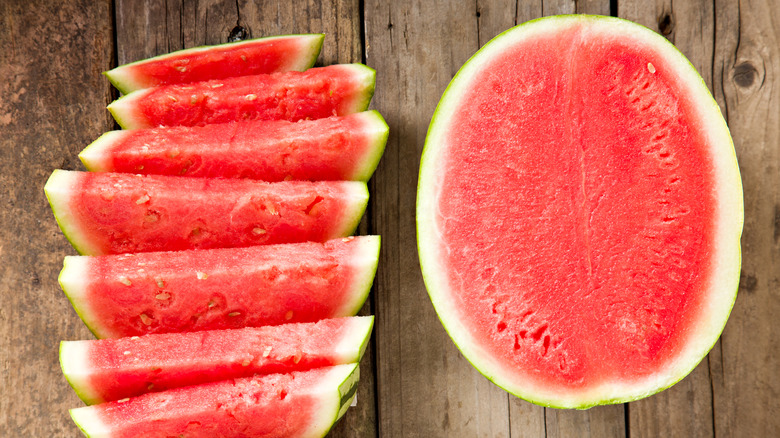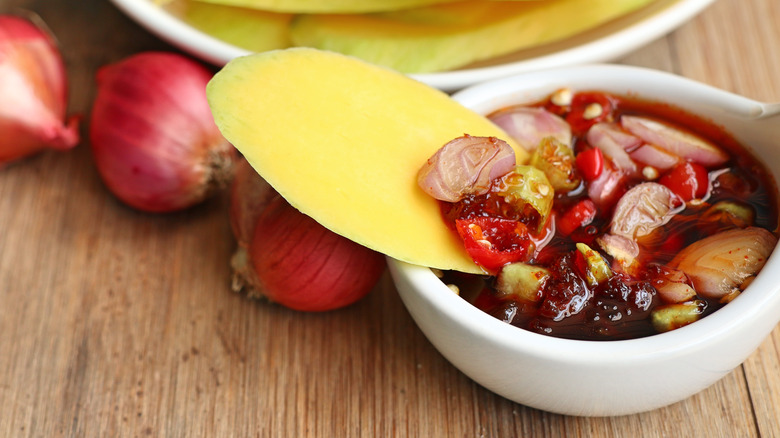A Touch Of Fish Sauce Can Elevate Mediocre Watermelon
From looking for color cues to checking its weight, you may have tried your hardest to pick the freshest and juiciest watermelon but somehow still came up short with a lackluster piece of fruit. Underripe watermelon can be bland and overly watery, not at all like its sweet and juicy perfectly-ripened counterpart. Surprisingly, a funky fish sauce might be the solution if your watermelon is sorely lacking in flavor.
We already know that salt can bring out the best flavors of other food. Just a touch of salt can tone down bitter flavors and enhance sweetness, which is one of the reasons it's a crucial component in baking recipes. For this reason, some people in the know are able to make their watermelon's flavor shine sprinkle just a little on their slices before digging into the juicy goodness. The same science is what makes the popular combination of briny feta and watermelon so appealing.
So, why use fish sauce? Like feta, the fermented sauce is also briny and salty, but it also has subtle sweet undertones, too. And, just like the flavor balancing act performed by cheese and fruit when they are paired, the umami of fish sauce complements the watermelon.
What is fish sauce?
Fish sauce is exactly what the name implies: a simple sauce produced with fish. And the process for making it is straightforward — smaller fish like herring, mackerel, sardines, and, most often, anchovies are packed with salt and allowed to ferment for a period of time. The liquid byproduct from the process is the salty sauce that's eventually bottled and labeled as fish sauce.
While using fish sauce can be a great way to jazz up your watermelon, it also has many health benefits. Like many fish, those used to make fish sauce have a good amount of omega-3, which can contribute to improved cholesterol and cognitive functioning. Fish sauce also has plenty of B vitamins which can also give your brain a boost, while its amino acids may help you sleep better at night.
The origin of fish sauce is not completely clear, with some attributing its creation to ancient Greeks and others pointing to Asian countries as the home of the original makers. For anyone interested in the sauce's centuries-long background, food historian Sally Grainger takes an in-depth look at the history of fish sauce in her book "The Story of Garum." Meanwhile, for those that want to take an even deeper dive into fish sauce's origin story, Vietnam's town of Phan Thiết is home to an entire museum dedicated to the condiment.
How is fish sauce used?
While watermelon with fish sauce may not be as ubiquitous as feta and watermelon salads, some high-profile people are pairing them. Chef and restaurateur Tom Colicchio features the two ingredients in his Thai-style Watermelon and Radish Salad. Meanwhile, Chrissy Teigen has a recipe for a similar style of salad on her Cravings site, too.
In addition to pairing with watermelon, you can use the sauce to brighten up the flavor of other fruits like apples, mangoes, and papaya. And those aren't the only sweets that may benefit from a bit of fish sauce. Abi Balingit, a Filipino-American cookbook author and blogger, enjoys infusing fish sauce into sweet recipes. In one such recipe, she uses it in a lime-based glaze to top her shortbread cookies.
As for savory meals, you can use the sauce to liven up nearly any dish. Use a splash of fish sauce to add flavor to your marinara, add a dash as a raw oyster topping, up the flavor in a marinade for any protein, and add umami to soups and stews.



